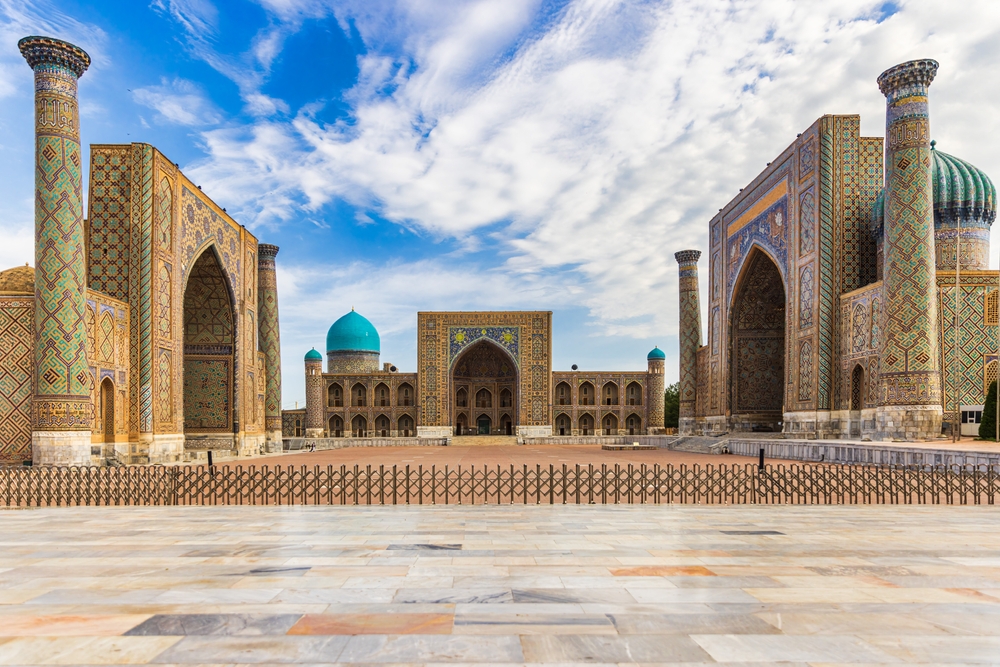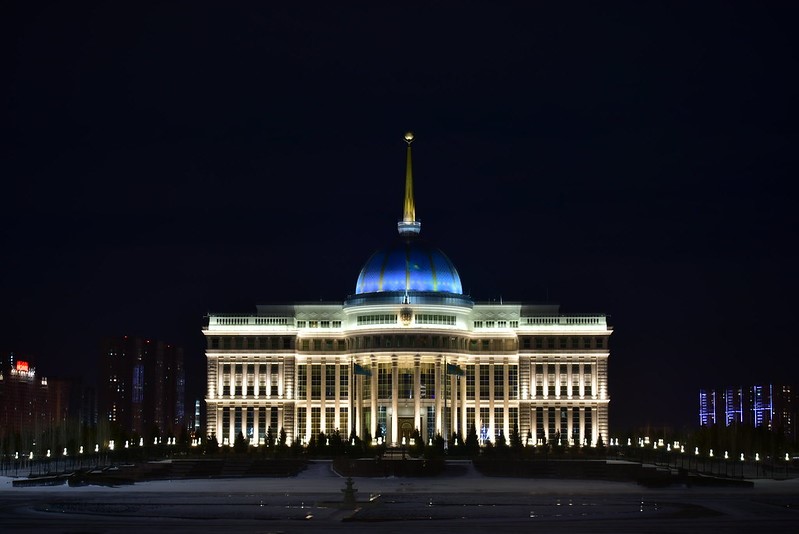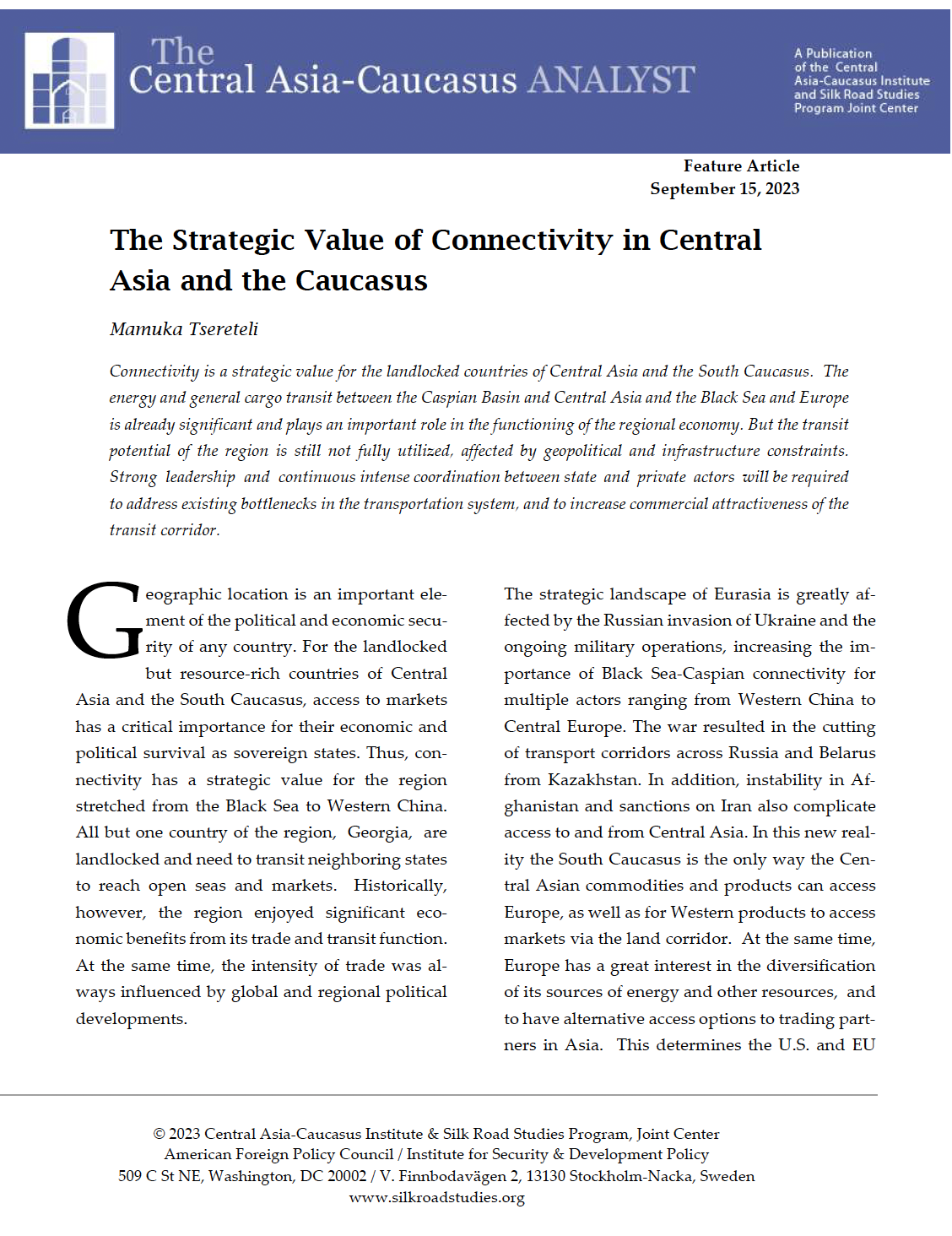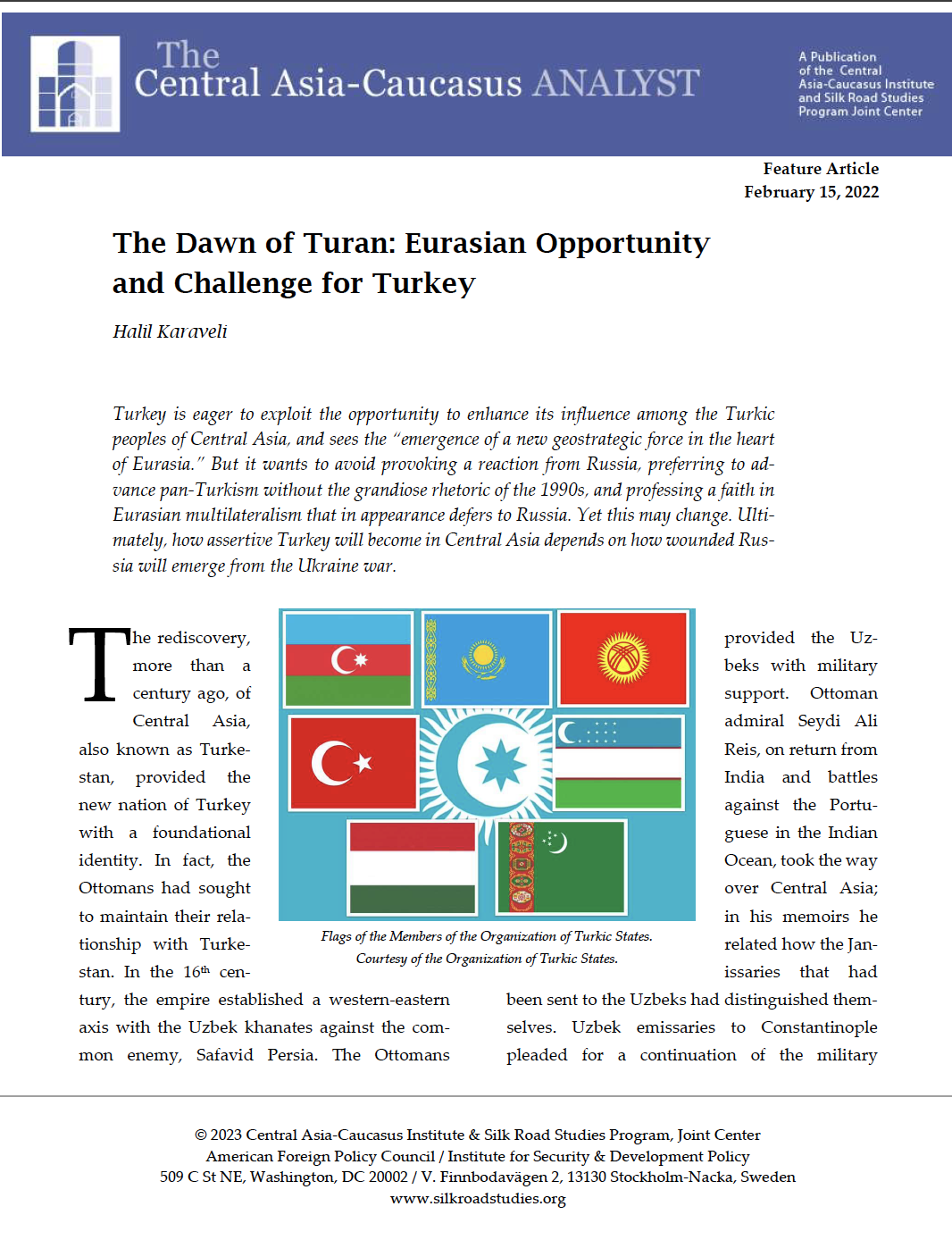A Partner, not a Power: The EU’s Evolving Engagement with Central Asia
By Mehmet Fatih Oztarsu
The first EU–Central Asia Summit took place amid intensifying global competition, emphasizing the EU’s efforts to strengthen ties through connectivity, economic diversification and access to critical raw materials. Key regional concerns—including migration, sanctions circumvention, and infrastructure gaps—were also addressed. There is growing anticipation that the EU will adopt a more holistic and regionally attuned strategy, moving beyond great power rivalry to foster inclusive, long-term partnerships. Such an approach would bolster the EU’s credibility as a constructive and complementary actor in Central Asia’s evolving geopolitical landscape. Instead of competing against Russia and China, the EU can play more effective role as a reliable partner.

Photo source: Framalicious
BACKGROUND: The first EU–Central Asia Summit was held in Uzbekistan on April 4, 2025, in Uzbekistan. The EU was represented by President of the European Council António Costa and Head of the European Commission Ursula von der Leyen. During the summit, multilateral relations were addressed in a comprehensive and multidimensional manner. The parties discussed various areas of cooperation, including security challenges, economic collaboration, connectivity under the Global Gateway framework and people-to-people ties.
The EU holds a distinct position in the region, being Central Asia’s second-largest trading partner and its largest investor, accounting for 22.6 percent of the region’s foreign trade and 40 percent of foreign investments. In particular, Kyrgyzstan, Uzbekistan and Tajikistan have expressed their intention to further develop trade relations with Europe under the Generalised Scheme of Preferences (GSP), which facilitates more favorable access to the EU market.
This summit is also significant given its timing—coinciding with a period in which the U.S., alongside Russia and China, has emerged as a competitor to the EU in the region. In this new geopolitical landscape, strengthening relations with alternative markets has become a strategic objective for all major actors. However, the EU is expected to adopt a clearer stance on key issues in its evolving engagement with Central Asia. There are growing expectations that the EU will address the unintended negative impacts of its sanctions on Russia, which have also affected the region. Additionally, greater emphasis is expected on areas that align more closely with the region’s pressing needs—such as agricultural development and connectivity infrastructure—rather than focusing narrowly on selected industries or geopolitical competition.
IMPLICATIONS: The EU’s timely convening of the Central Asia Summit coincided with a period in which global developments are compelling all countries to make new strategic choices. Actors affected by the protectionist U.S. economic policies, Russia’s war in Ukraine, and China’s rapid and seemingly unstoppable economic expansion are increasingly seeking new avenues for cooperation. While the EU already maintains a satisfactory level of economic engagement with the region, this new initiative signals an ambition to address more niche and forward-looking areas. These include specific areas such as geographical and digital connectivity, the green economy, critical raw materials and water management.
Within the Global Gateway initiative, the EU has sought to engage with the region primarily through infrastructure projects, allocating a budget of €300 million for this purpose. Although the EU’s initial intention was, to some extent, to compete with China, it has opted for a more nuanced and tempered approach in recent years. As Dr. Stefan Meister from the German Council on Foreign Relations explains, “EU is not about seriously challenging China and Russia, but rather about offering some alternatives in some sectors, competing in some sectors—especially on raw materials and on connectivity.” This perspective reflects the EU’s new approach of pragmatic engagement rather than direct confrontation, seeking to expand its influence through sector-specific cooperation and strategic investments.
Given China’s geographical proximity and economic leverage, it has become clear that directly confronting Beijing’s dominant position in Central Asia would yield little benefit for any actor involved. Instead, the EU has pursued a strategy of complementarity rather than rivalry. Central Asian countries, positioned to benefit from this geopolitical pragmatism, stand to gain significantly—particularly through the further development of the Trans-Caspian Transport Corridor, which promises to enhance regional connectivity, linking the EU and Central Asia within 15 days and expanding their access to diversified markets.
In addition, the issue of critical minerals is also of great importance in the new period. The EU’s Critical Raw Materials Act, proposed in March 2023, aims to ensure a secure, sustainable and diversified supply of critical raw materials essential for strategic sectors. As demand for materials like rare earths and especially lithium is projected to increase up to twelvefold by 2030, the EU seeks to reduce its overreliance on single third-country suppliers. The Act sets specific targets: at least 10 percent of the EU’s annual consumption should be extracted within Europe, 40 percent processed, and 25 percent recycled, with no more than 65 percent of any strategic raw material imported from a single external source. These measures are central to the EU’s efforts to diverse partnerships with Central Asia.
Kazakhstan’s substantial uranium reserves and its role as a producer of 19 critical raw materials essential to the EU make it a strategically important partner. Additionally, Kyrgyzstan, Tajikistan, and Uzbekistan possess reserves of 43, 17, and 71 critical minerals respectively, further enhancing the region’s value from the EU’s perspective. However, despite this resource richness, the region’s transport connectivity remains heavily influenced by Russia and China—posing a significant challenge for the EU as it seeks to establish independent and secure supply routes.
Migration constitutes a growing challenge in EU–Central Asia relations in addition to the risk of sanctions circumvention and agriculture development limitations. The EU has expressed increasing concern over migration flows originating from or transiting through the region—particularly given instability in Afghanistan and broader socioeconomic pressures within Central Asia. Despite this pragmatic exchange, questions remain about the long-term sustainability and oversight of such processes.
On the other hand, an increasing number of Russian companies are reportedly using Central Asia to circumvent Western sanctions, raising concern within the EU. Russian-affiliated businessmen have begun relocating portions of their assets to countries in the region to shield them from asset freezes, a development the EU views unfavorably. In 2024, several companies were added to the U.S. sanctions list. Additionally, remittances from Russia remain a vital source of income for countries like Tajikistan and Kyrgyzstan. However, since the imposition of sanctions, this financial flow has become unstable, posing significant challenges to the economic stability of these remittance-dependent economies. The EU needs to address this issue in the future since there is no specifically designed policy to resolve it.
Lastly, the EU has been slow to support the broader economic development of Central Asia. According to World Bank data, the agriculture sector remains a weak component of total GDP in the region: 4 percent in Kazakhstan, 9 percent in Kyrgyzstan, 11 percent in Turkmenistan, 20 percent in Uzbekistan and 22 percent in Tajikistan. The service sector dominates these economies, accounting for 56 percent in Kazakhstan, 52 percent in Kyrgyzstan, 45 percent in Turkmenistan, 43 percent in Uzbekistan, and 35 percent in Tajikistan. Under these conditions, the EU needs to play an effective role in strengthening the region’s capacity for industrial production and economic diversification. A narrowly focused strategy centered solely on gas, oil, and critical raw materials risks undermining the long-term goals of sustainable and inclusive cooperation.
CONCLUSION: Although EU policy frameworks are often presented with ambitious and appealing labels, critical areas remain that require greater attention in Central Asia. Rather than pursuing selective economic cooperation, the EU should prioritize agricultural development, the diversification of industrial sectors and the provision of sufficient infrastructure support. Moreover, a clear and coherent stance on the indirect impact of sanctions against Russia in the region is urgently needed. These ongoing uncertainties and regional expectations will play a defining role in shaping the future trajectory of EU–Central Asia relations.
On the other hand, framing cooperation with Central Asia solely as a tool for competing with Russia and China is unlikely to yield meaningful benefits for either the EU or the region. A more constructive approach would involve the EU positioning itself as a complementary partner, offering alternatives rather than rivalry. This strategy not only fosters regional stability but also helps mitigate the negative effects of U.S. protectionist tendencies, thereby strengthening the EU’s credibility as a balanced and reliable actor in Central Asia.
AUTHOR BIO: Dr Mehmet Fatih Oztarsu is Assistant Professor at Joongbu University and Senior Researcher at the Institute of EU Studies at Hankuk University of Foreign Studies. He studied and worked in Baku, Yerevan, Tbilisi, and Seoul as an academic and journalist. He is the author of numerous articles and books on South Caucasus and Central Asian affairs.
Azerbaijan's Inclusion in the Abraham Accords will Transform the Commercial Architecture of Eurasia's Southern Rim
By Michael Tanchum
The Eastern Mediterranean and the Black Sea are one natural waterway forming the core of a multi-modal connectivity arc that can serve as the transportation backbone of a commercial corridor spanning the Middle East and Central Asia. Azerbaijan’s inclusion in a wider Abraham Accords framework could radically reconfigure trade patterns and manufacturing value chains across the southern rim of Eurasia, to the benefit of U.S. strategic interests and those of its partners. While strengthening U.S.-Israel-Azerbaijan trilateral defense cooperation is a response to the looming prospect of a military showdown with Iran, the geo-economic significance of Azerbaijan’s inclusion in the Abraham Accords is of long-term strategic consequence. With the ports on Israel’s Eastern Mediterraneancoast and Azerbaijan’s Caspian Sea coast serving as anchor points, the India-Middle East-Europe Corridor can be linked to the Trans-Caspian International Transport Route, creating an crescent of commercial cooperation from India to the Central Asian Republics via the UAE, Saudi Arabia, Jordan, Israel, Georgia, and Azerbaijan, providing counterweight to the westward expansion of Chinese economic hegemony across the Central Asia-Caucasus region and the Middle East.

Photo source: Michael Tanchum
BACKGROUND: In early March 2025, the office of Israeli Prime Minister Binyamin Netanyahu made public that it favors elevating the trilateral partnership between Israel, Azerbaijan and the U.S.. Following a motion in the Israeli Knesset on "Upgrading the Strategic Alliance between Israel and Azerbaijan," a flurry of calls arose for Azerbaijan’s inclusion in the Abraham Accords. The September 15, 2020, agreement normalized relations between the United Arab Emirates (UAE) and Israel, followed by the establishment of relations between Israel and Bahrain and Sudan, respectively, and the restoration of relations with Morocco. The Abraham Accords also consists of an expanded framework of strategic and economic initiatives among the participants, developed in partnership with the U.S.
Azerbaijan and Israel have enjoyed an all-weather strategic relationship since diplomatic relations were established in the early 1990s following Azerbaijan’s independence. The two states have developed deep defense cooperation over the past 30 years, based on countering the threat Iran poses to both Israel and Azerbaijan, which shares a 428-mile (689 km) border with the Islamic Republic. Key proponents of extending the Abraham Accords to Azerbaijan have emphasized the Azerbaijani-Israeli defense relationship’s durability and Azerbaijan’s reliability as a principal oil supplier to Israel. Azerbaijan and Israel enjoy commercial cooperation in telecoms and other technology sectors. The State Oil Company of Azerbaijan (SOCAR) recently established the new subsidiary “SOCAR Tamar” following its March 17, 2025 acquisition of a 10 percent stake in Israel’s Tamar offshore natural gas field in the Eastern Mediterranean. Azerbaijan has also played an important mediating role between Baku’s close partner Turkey and Israel during times of tension.
Netanyahu’s public commitment to strengthen Israel’s trilateral relationship with Azerbaijan and the U.S was preceded by a collection of letters sent to U.S. President Donald Trump at the end of February by prominent rabbis advocating Azerbaijan’s inclusion in the Abraham Accords. Among them was a senior rabbi in the UAE and personal friend of Trump’s son-in-law Jared Kushner, who played a key role in the signing of the Abraham Accords. Additionally, opinion pieces from Israeli and American policy communities, including in the Wall Street Journal, added further political momentum amidst escalating tensions between Washington and Tehran over Iran’s nuclear weapons program. Two days after Iran’s Supreme Leader Ayatollah Ali Khamenei’s March 12, 2025, rejection of the U.S. proposal to hold negotiations about Tehran’s nuclear weapons program, Trump’s special envoy to the Middle East Steve Witkoff visited Baku after an overnight visit to Moscow, in what appears to be a coordinated effort to prepare for possible military action against Iran by Israel or the U.S., following the exhaustion of diplomatic efforts.
IMPLICATIONS: Beyond defense cooperation, a compelling strategic and geo-economic logic exists to include Azerbaijan in a wider Abraham Accords framework, building upon the Azerbaijan’s parallel and separate bilateral economic relations with Israel and the UAE. Extending the Abraham Accords framework outside the Arab World has precedence in the quadrilateral cooperation among India, Israel, the UAE, and the U.S. – the “I2U2” framework – emerging from India’s robust yet parallel commercial cooperation and joint venture investments with Israel and the UAE. Trilateral cooperation emerged organically from the synergies between India’s commercial ventures with Israel and the UAE, traditionally India’s third-largest trading partner and Arabian Sea neighbor.
In February 2022, the UAE signed a Comprehensive Economic Partnership Agreement (CEPA) with India followed by the May 2022 signing of a similar UAE-Israel free trade agreement. The two trade agreements paved the way for initiating three-way coordination in developing an India-Middle East Corridor. Quadrilateral cooperation involving the U.S. was then formalized with the July 2022 I2U2 summit.
The extended Abraham Accords cooperation gave rise to a vision of an India-to-Europe commercial corridor in which the UAE’s ports serve as the Indian Ocean connectivity node with Israel’s Eastern Mediterranean ports serving as the maritime outlet to Europe, connected by a UAE-to-Israel railway network transiting Saudi Arabia and Jordan. Once the transportation route is operational, Indian goods leaving Mumbai could arrive on the European mainland in as little as 10 days. An initiative to realize this corridor, now known as the India-Middle East-Europe Corridor (IMEC) was formalized with the signing of the September 9, 2023, Memorandum of Understanding at the New Delhi G20 Summit, with India, the U.S., the UAE, Saudi Arabia, France, Germany, Italy, and the EU as signatories.
Research has shown that commercial corridors only emerge where the requisite large investments in port and rail infrastructure are coupled with an industrial base anchored in manufacturing value chains. The IMEC is highly conducive for value chain integration because of the existing synergies between India’s commercial ventures with its Arab Gulf partners and its commercial ventures with Israel, as exemplified by the manufacturing value chain in food production that is one of the leading drivers of the IMEC’s development. India’s “Food Corridor to the Middle East” is driven by India’s investment partnerships with the UAE and Saudi Arabia that rely on the transformation of India’s agriculture and water management sectors being implemented through India’s partnership with Israel. Similar synergies exist in other sectors, with the most promising in green energy and innovative technology, which has already lead to joint venture production facilities in green manufacturing.
The inclusion of Azerbaijan, along with Georgia, in the wider Abraham Accords framework holds a similar potential to create a new trans-regional commercial architecture. The UAE is Azerbaijan’s top Arab trading partner, accounting for 40 percent of Azerbaijan’s trade with the Arab World. The UAE is also the largest Arab investor in Azerbaijan and one of the top 10 global investors in Azerbaijan, accounting for 7 percent of Azerbaijan’s FDI inflow. In 2023, the UAE’s Abu Dhabi National Oil Company acquired a 30 percent stake in Azerbaijan’s Absheron natural gas field in the Caspian Sea. Similarly, the UAE is Georgia’s largest trading partner in the Arab world, accounting for 63 percent of Georgia’s trade with the region. Trade is likely to increase further with the UAE-Georgia CEPA, which came into effect in June 2024. The UAE is also invested in solar power plant development in both Azerbaijan and Georgia. Most significantly, in March 2024, the UAE’s AD Ports group, acquired a 60 percent ownership share in the Tbilisi Dry Port, a new custom-bonded and rail-connected intermodal logistics hub in Georgia. At the heart of the Trans-Caspian Route, the port is a key logistics facility for the rail connection linking Georgia’s Black Sea coast and Azerbaijan’s Caspian coast.
Azerbaijan’s Baku port is the connectivity node from where the Wider Black Sea region connects to Central Asia across the Caspian Sea. The Trans-Caspian International Transport Route (TITR) connecting the Caspian and Black Seas via Azerbaijan and Georgia, commonly referred to as the Middle Corridor, was developed as an alternative to the Russia-based Northern Corridor for China-to-Europe trade. The TITR consists of multi-modal transportation links for container transshipment via Kazakhstan’s Caspian port Aktau to the specially constructed port of Baku at Alat from where goods can be shipped by railway connection from Azerbaijan to Georgia’s Black Sea ports and in turn to Israel’s Eastern Mediterranean ports. By linking IMEC and the TITR, India will possess its own multi-modal corridor to access Central Asia, enabling India to effectively compete with China in Eurasia without being reliant on Russia or Iran. IMEC provides India with a streamlined alternative to its 25-year effort to establish the troubled International North-South Transit Corridor (INSTC) to access Central Asia through Iran’s Chabahar port, serving as the Indian Ocean connectivity node with overland transportation links running northward via Iran and Afghanistan.
The multi-modal corridor connecting India to Central Asia would also open the opportunity for Turkey to participate in IMEC. The UAE’s ports and logistics giant DP World operates Turkey’s Yarımca port, reputed to be the most technologically advanced in Turkey. Yarımca’s Marmara coast location is highly suited for intermodal transportation in which cargo can be transshipped to the Black Sea or Georgia and Azerbaijan by rail from Kars via the Baku-Tbilisi-Kars railway.
CONCLUSION: The September 2023 signing of the IMEC declaration was preceded by the July 2022 I2U2 summit, the first convening of the heads of government of India, Israel, the UAE, and the U.S. As a step toward linking IMEC with the Trans-Caspian Corridor, a CC-I2U2 summit should be convened with the heads of Azerbaijan and Georgia participating. The format can be extended to include Central Asian Republics as well as Saudi Arabia and Jordan in anticipation of the extended arc of joint venture manufacturing investments and commercial cooperation.
By including Azerbaijan in a wider Abraham Accords framework, the U.S. can upend the geopolitics of connectivity in Central Asia, halting the westward expansion of Chinese commercial hegemony across the Eurasian landmass. Linking the IMEC corridor to the Caspian shores of Kazakhstan via a multi-modal sea route with trans-shipment across Georgia and Azerbaijan will effectively end India’s isolation from Central Asia – a strategic objective long sought by New Delhi. Consolidating the triangle of bilateral economic relationships among Azerbaijan, Israel, and the UAE into a multilateral framework through U.S. facilitation under the Abraham Accords is a necessary first step and a boon to the U.S. strategic position across Eurasia’s southern rim.
AUTHOR BIO: Prof. Michaël Tanchum teaches international relations of the Middle East and North Africa at the University of Navarra, Spain and an associate fellow in the Economics and Energy at the Middle East Institute in Washington, D.C. He is also a Senior Associate Fellow at the Austrian Institute for European and Security Studies (AIES) and an affiliated scholar of the Centre for Strategic Policy Implementation at Başkent University in Ankara, Turkey (Başkent-SAM) and the NTU-SBF Centre for African Studies in Singapore. @michaeltanchum
The Strategic Value of Connectivity in Central Asia and the Caucasus
By Mamuka Tsereteli
September 15, 2023
The Dawn of Turan: Eurasian Opportunity and Challenge for Turkey
By Halil Karaveli
February 15, 2022
Managing Strategic Competition: Kazakhstan's Peacemaking Initiatives
By Svante E. Cornell and S. Frederick Starr
December 22, 2020, the CACI Analyst
In recent years, the security situation on the Eurasian continent has grown increasingly unstable. Great powers are less constrained by international norms and institutions, undermining peace and security from Crimea in the West to Xinjiang in the East. This poses a serious challenge to the states of Central Asia, caught in the center of the continent. Some, and particularly Kazakhstan, have responded by growing international activism – not least by contributing to the management and resolution of the conflicts and controversies that could affect their security. That makes these states natural partners for the United States and Europe.





